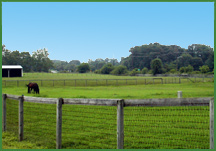|
Ryders Lane Best Management
Practices
Demonstration Horse Farm
 |
|
Through the use of best
management practices, equine facilities can flourish while
remaining environmentally friendly. |
In 2005 a team of Rutgers researchers affiliated
with the Equine Science Center and several state and federal agencies
began a multi-year collaboration. They sought to develop a demonstration
working horse farm on the Cook campus that would use
agricultural best management practices to provide solutions to many of
the problems facing farm owners and stable managers today.
Our researchers have identified numerous environmental
issues, such as preserving water quality, proper nutrient and waste
management, farm and pasture management, weed control, fencing, pasture
rotation, and soil enrichment. These are just a few of the many facets
of farm management that the project will address.
Located at the existing Ryders Lane facility on
approximately 40 acres, the facility, when complete, will be not only be
a model best management practices horse farm, but also a learning center
where research, education and proactive outreach through live
demonstrations and twilight seminars will enrich the public’s
understanding of how to successfully manage the environmental challenges
their farms may pose.
Goals of the project:
- To develop and maintain the Ryders Lane facility as a
demonstration working horse farm by implementing best management
practices (BMPs) which address pasture management, stormwater, and
manure issues. BMPs are cost-effective and easy to implement.
- To conduct
educational programs at the farm which demonstrate the
implementation of best management practices to enhance and maintain
pasture and water quality.
- To utilize the farm
site to conduct research on new forage varieties.
- To provide learning
experiences and educational programs in pasture renovation, forage
varieties, soil fertility, weed identification and management,
rotational grazing, storm water management and manure storage,
composting, and utilization.
Equine Science Center partners for
this project include:
- Region II of the
U.S. Environmental Protection Agency
- The Natural Resources Conservation Service
- The Northeast Sustainable Agriculture Research and Education
Program of the U.S. Department of Agriculture
- The New Jersey Department of Agriculture
- The New Jersey Department of Environmental Protection
- The Center for Turfgrass Science at Rutgers University
- The Department of Animal Sciences,
SEBS, Rutgers
University
- The Department of Ecology, Evolution and Natural Resources,
Rutgers University
- Rutgers Cooperative Extension of the New Jersey
Agricultural Experiment Station
- The Service
Department of Animal Care, Rutgers Cooperative Extension
 |
